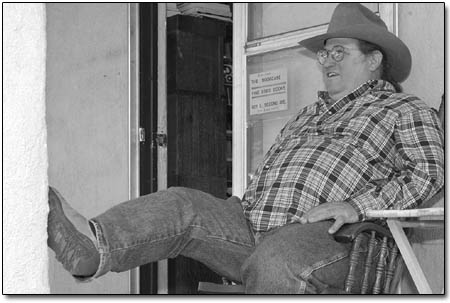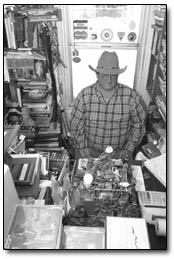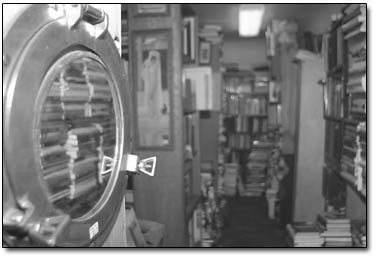|
Hanging out with the Southwest Booktrader
written by Missy Votel
 |
| George Hassan, aka
the Southwest Booktrader, takes in the view from the
porch of his shop Tuesday. Hassan has been dealing
in used books in Durango for 18 years./Photo by Todd
Newcomer |
Inside his small store, George Hassan sits at his desk,
buried behind teetering stacks of books, CDs and miscellanea.
A purveyor of used books for nearly two decades, he has
managed to fill every nook and cranny of his 1,200-square-foot
store. Countless books cover every genre, from Chinese
kung fu to dog training, and represent a broad cross-section
of writers, from Milan Kundera and Sylvia Plath to the
Frugal Gourmet and Miss Manners. There’s even a
Barry Manilow autobiography carefully tucked away in the
nonfiction section.
Despite what may look like a library run amok, Hassan
insists there is a method to the madness of bulging shelves
and towering stacks.
“Everything’s stacked by subject,”
he says.
But when asked how many books he has amassed, he only
shrugs.
“I don’t even have a clue – twice as
many as there’s room for,” he says. “And
I have this many two times over in storage.”
Hassan admits the store can be daunting for a rookie
or half-hearted book hunter.
“This isn’t the best for people who don’t
want to root around,” he says. “You have to
be a person who’s not intimidated by a little clutter.”
And it’s definitely not the place for claustrophobes.
“Some people who are claustrophobic come in and
take one look and say, ‘Whoa, get me outta here,’”
he says.
But for that gregarious book lover, it’s possible
to get lost in the seemingly endless maze of narrow passageways
– quite literally.
“I once locked someone in overnight,” he
admits. “I didn’t know anyone was in here,
and I closed the door and went home.”
 |
Hassan surrounded by a few of his
treasures./Photo by Todd Newcomer. |
Fortunately, the door locked from the inside, and the
abandoned customer was able to let himself out, but not
before leaving money on the counter for a book he bought.
Hassan said when he returned to the store after being
notified by police that it was unlocked, he found several
more piles of money on the counter with little notes from
customers saying which books they bought and for how much.
“I showed up and the door was still wide open and
people were coming and going,” he said. “But
everything worked out all right. I’m lucky no one
walked off with the cash register.”
In the 18 years Hassan has operated his sleepy Southwest
Booktrader – 15 from its current location in a pink
stucco house on 5th Street and East Second Avenue –
he has watched Durango go from boom to bust and back again.
And, for the most part, he is wary of what he sees –
a quirky small town being swallowed up by greed and corporatization.
Indeed, a tangible sign of the latest boom lurks not
more than a couple hundred yards in the distance. A new
multistoried condominium complex is going up where Durango’s
hostel once was. Hassan has just received word from the
city that work on a sewer line will take place on the
one-way street leading to his off-the-beaten path store,
and he is peeved. After last summer’s fires, he
fears an impediment to his foot traffic could spell the
end of the business he and his wife, Nancy Portera, have
so carefully cultivated.
“I nearly went bankrupt last summer,” he
said. “Tearing up this street out here will kill
me.”
After stewing for a few more moments, Hassan, in his
trademark cowboy hat and long ponytail, moves to a rocker
on the store’s front porch. Without skipping a beat,
he calls out to two tentative customers as they make their
way up his sidewalk.
“Hi folks. Are you familiar with the store?”
he asks. Their blank looks indicate they are not, so Hassan
breaks into his spiel. “Paperbacks are 50 percent
off the cover price. Prices for hard covers are written
inside the jacket.”
The two express their thanks and disappear into the well-organized
chaos.
For locals, Hassan said he’ll throw an additional
10 percent off the price of books, as a show of appreciation.
“My business is 50 percent locals,” he says.
“If it wasn’t for my regular customers, my
business wouldn’t have been here this long.”
A Front Range refugee, Hassan started his business upon
moving to Durango and noticing there was no used book
store at the time. He credits his longevity to the niche
rare-book market he has created. “Collectors make
up the lion’s share of my money,” he said.
“I’ve sold books for $5,000 or $6,000, rare
maps, photographs.”
 |
| A mirror reflects the
hordes of books Hassan has amassed in his 1,200-squarefoot
store over the years. Although he has no idea how
many books he has, he says there are twice as many
more in storage./Photo by Todd Newcomer. |
However, casual customers won’t see Hassan’s
dearest treasures lining the shelves. “The real
expensive stuff I keep tucked away,” he says. “People
have to ask for it.”
Hassan said he has seen some erosion of his business
over the years to the 24-hour accessibility of the Internet
and an increasingly consumption-oriented, throw-away society.
He recounts the story of a garage sale he recently attended
where a woman was selling close to 1,000 brand new books.
When asked if she had read any, she said no, that she
bought them because she hated to leave a store emptyhanded.
“She wasn’t reading them, she was decorating
with them,” he said. “A lot of people buy
books because they want to look smarter. But they never
read them, and they never get any smarter.”
Hassan believes the future of his business is further
threatened by the publishing industry, which taking a
cue from such consumers now creates weak bindings that
fall apart after only a few readings. “I personally
believe they do that to limit the secondary market on
them,” he said. “They would just as soon see
the books thrown out.”
To illustrate his example, he picks up a book from his
desk: a copy of Zane Gray’s Lost Pueblo, printed
in 1959. “Probably been read 50 times,” he
says as he bends the spine of the book back and forth
to illustrate its dexterity. He then picks up a more modern
paperback. “I don’t think you’re going
to find these being passed around hand to hand in 15 to
20 years.”
Nevertheless, don’t expect Hassan to give up the
early-morning garage sale crawls, the haggling or the
rat packing. He said he believes there are still enough
devout bookies out there who see the advantages of the
real thing over the virtual version to keep him afloat.
“People still like to come in; they want to hold
the book in their hands,” he says. “Browsing
on the Web is no fun at all.”
Furthermore, his livelihood is more than a job –
it’s a hobby, a way of life, a manifesto that extends
far beyond the crammed walls of his store.
“Everything I own, if I don’t have to buy
it new, I don’t,” he says.
And although Hassan boasts that he has the largest number
of titles of any store in town, he also is quick to admit
he’s not the be-all end-all for bibliophiles.
“I send people to the other stores, the Bookcase,
Walden’s, Maria’s,” he says. “If
I don’t have what they’re looking for, I try
to help them find it.”
It is this mutual support that Hassan feels is vital
to homegrown businesses such as his, where customers can
come and go on the honor system, shoot the breeze on a
lazy afternoon or hunker down in a quiet corner for hours
on end.
“If you want to have a community with any life
in it, you have to support the little guy,” he said.
“I would just as soon go to Kroeger’s for
nuts and bolts than save a quarter at one of the megastores.”
|

